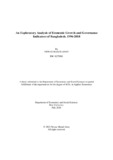| dc.description.abstract | Bangladesh has been experiencing a steady economic growth around seven percent for the
last few years. Although the economy is growing faster but the governance indicators are
showing a different scenario in six dimensions of governance: voice and accountability,
political stability, government effectiveness, regulatory quality, rule of law and control of
corruption. Thus, there has been a wrangle regarding the relationship between economic
growth and governance. This thesis examines the relationship of World Governance
Indicators (WGI) and GDP growth of Bangladesh. Both exploratory and econometric
analyses of the relationship have been undertaken. The study estimates regression model
using data for the period, 1996-2018. The regression results find that control of corruption
(CC) is the most important governance variable that influences positively on economic
growth. Similarly, rule of law (RL) shows significant positive relationship to economic
growth. Although the estimated coefficient for voice and accountability (VA) is statistically
significant, the negative magnitude of the coefficient does not really reflect the expected
impact on GDP growth, perhaps due to small sample size of the study. However, the
remaining three variables such as government effectiveness (GE), regulatory quality (Reg)
and political stability (PS) are not found statistically significant and have not really impacted
economic growth in Bangladesh. Therefore, if corruption can be curbed and ensure rule of
law, we will able to attain a steady higher economic growth. In this paper, we have carried
out tests to determine the presence of serial correlation. The results show no presence of
serial correlation, hence, no corrective measures required. As the sample size is small there
are the issues of stationarity, causality, multicollinearity, endogeneity that may arise in time
series model. Within the purview of this analysis, we refrain from carrying out further tests of
perfect collinearity, heteroskedasticity, stationarity, etc for the purpose of simplicity.
However, such tests are highly recommended for more reliable and robust results. | en_US |

